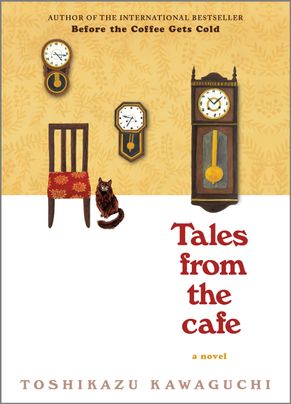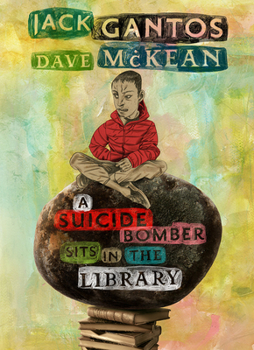Five people, each at a crossroads in life, find their way to the Community Library, a place none of them had given much thought to before. Tomoka, Ryo, Natsumi, Hiroya, and Masao discover that reference librarian Sayuri Komachi will not only find the books that will answer your question, she also finds books to answer the question you didn't know you had. The mysterious librarian also gives a bonus gift in the form of a felted trinket to each of the seekers. The description of Ms. Komachi provides an interesting take on the old librarian stereotype, and one that demonstrates a larger than life perspective
The librarian is huge...I mean, like, really huge. But huge as in big, not fat...she is wearing a beige apron over an off-white, loose-knit cardigan...Her hair is twisted into a small tight bun right on top of her head, and she has a cool kanzashi hairpin spiked through her bun with three white flower tassels hanging from it.
Natsumi is a parent to a young child (Futaba). She works at a publishing house and before her daughter was born she was an editor for a magazine called Mila. However, when she returned to work following a short maternity leave she was placed in the information resources department where her job was
to retrieve data for employees upon request, and seek various permissions when required...also [writing] company profiles for the website and other PR material for external use
While she does not identify herself as a librarian, those of us who do the work know what she is.
I was particularly intrigued by this passage regarding Natsumi's work
In my Mila days, I used to have no reservations about reading at my desk, since anything could be a potential source of ideas. But in Information Resources I hesitated to do any general reading. Just in case my colleagues might think I was slacking off.
It is not unusual for people to make comments about how great a librarian's job must be with "nothing to do all day but read". You can be sure this comment will raise some serious ire, followed by an explanation about how librarians have ABSOLUTELY NO TIME TO READ as we are much too busy answering reference questions, ordering books, unjamming printers, supervising clerks, resolving database and computer problems, and a myriad of other things. Here is my truth: sometimes I was busy, and sometimes I wasn't. As a public services academic librarian I was usually pretty busy teaching classes, and helping people with research during about eight months of the year. During the summer months though I read - a lot! Much of what I was reading was professional literature, or things relevant to my research interests, but sometimes I was just reading for fun. There seems to be way too much concern that a person might have "down time" at work. In library work, no matter what your role, I would argue that reading is the best use of such time because as Natsumi says "anything could be a potential source of ideas." Generally being a well-read person helped me to answer more than a few reference questions.
Ms. Komachi is often found busy working on her felting. When Masao finds her doing this he "sense[s] anger in her expression and she seems unapproachable." Masao had misread the expression. In fact Ms. Komachi was quite ready to help. The question of approachability has come up a lot during my tenure in public service. As I said, down time is not unusual and it is unreasonable to think that we would sit doing nothing. I was often doing research when I wasn't directly teaching, or helping someone, but that didn't mean I wasn't available.
Hiroya is a young man who is not sure where he fits in. He is described as a NEET (not in employment, education, or training). He enjoys manga and hopes to be an artist. Ms. Komachi mentions that he seems to know a lot about manga. He responds that his uncle used to own a manga café "a coffee shop with heaps of manga...They don't have private rooms, just tables where you can sit and order a drink, then read from the manga library in the shop."
Ms. Komachi is not the only library employee of course. All the characters also get help from Nozomi, a library assistant who aspires to be a librarian. She explains to Hiroya that "if you take a library assistant training course...then work for three years, you can qualify for the librarian training course...you can also go to university to study". Hiroya is impressed that "becoming a librarian is harder than [he] thought." This is another thing that is not well understood among the general population. In fact most people who work in libraries are not librarians. Those who are at the desk checking out books, or who reshelve returned books, or process them to be made available, or work to keep the library clean, or run the in-house coffee shops, are not librarians. In most cases, in order to get work as a "librarian" one needs to have completed a Master's degree in Information and Library Science (MILS). Although sometimes those without the degree have the title, the MLIS is the usual and accepted credential needed for professional librarian work.
Ultimately Ms. Komachi is a binding force between the characters, each other, and their community.
A story about making meaning and finding your place. I read this one aloud to my husband. We both enjoyed it.





